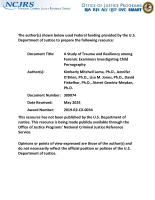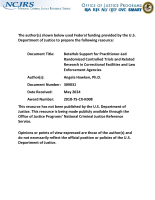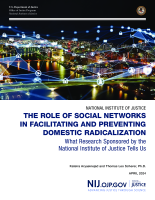Law enforcement
A Study of Trauma and Resiliency among Forensic Examiners Investigating Child Pornography
A National Portrait of Project Safe Neighborhoods Implementation
Multidisciplinary Threat Assessment and Management Teams in Practice: Common Elements and Operations of Community Based MTAMTs
What You Can’t Buy, Can’t Kill You
BetaHub Support for Practitioner-Led Randomized Controlled Trials and Related Research in Correctional Facilities and Law Enforcement Agencies
Drug-Impaired Driving: The Contribution of Emerging and Undertested Drugs
Forensic DNA Interpretation and Human Factors: Improving Practice Through a Systems Approach
Unconventional Wisdom: Research Shakes Up Assumptions About Sex Trafficking Clues in Online Escort Ads
Scientific study finds that many widely recognized indicators of trafficking in online escort ads are likely not reliable. Research also produces new practice guide.
Closing Cases Using Gunshot Residue
Closing Cases Using Gunshot Residue
Not every crime scene will have definitive evidence, such as DNA, to link an individual to a crime. In those cases, law enforcement relies on other evidence to build the burden of proof. NIJ graduate research fellow Dr. Shelby Khandasammy developed a tool to analyze organic gunshot residue and distinguish between different firearms calibers and manufacturers. She joins Marie Garcia, office director for the Office of Criminal Justice Systems at NIJ, to talk about her work and experience as a research fellow.
Death Investigation: A Guide for the Scene Investigator, 2024
From Research to Reality: Recruiting More Women into the Policing Profession: Preliminary Results of an NIJ-funded Applied Research Project
This webinar features the work of Dr. Jen Ranier, a research psychologist who studies workplace and workforce issues at RTI International. The project presented in this webinar had the goal of identifying ways to help law enforcement agencies recruit more women.
See the YouTube Terms of Service and Google Privacy Policy
Lessons Learned on the Methodological Challenges in Studying Rare Violent Incidents
To increase knowledge and aid prevention efforts, the research community must develop a strategy to source, code, check, and analyze the data surrounding rare violent incidents.






